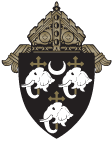Afternoon tea, maybe some Gregorian chant. The expectation is that a conference of the Federation of Diocesan Liturgical Commissions (FDLC) would be a rather sedate affair.
Msgr. John H. Burton, former chairman of the group, knows differently. In particular, he cites the first conference he held the gavel, back in 2000. Gathering in Orange, Calif., the arguments flared, sometimes angrily, as the liturgists debated the fine points of a new liturgical English translation.
The stakes were high. The discussions ranged far beyond the meaning of “consubstantial,” a word which eventually made its way into the Mass. Anyone who cares about the Church knows how the liturgy is central to its life, Msgr. Burton, pastor of Good Shepherd Parish in Vineland, said in a recent interview.
“Liturgy is not just about the celebration. It’s about the Church,” he said. “What we do in liturgy is the reason for our existence. It is the center of our lives as Christians. It is the source and summit of the Christian life.” The Mass should transform its participants, who, partaking in the Eucharist, are inspired, in the words of St. Augustine, “to eat what you are, become what you eat.”
Msgr. Burton, who served on the FDLC board since 1993 and as its chair since 1998, stepped down from those leadership posts in March, as the group completes a re-organization. Formed after Vatican II, FDLC has been at the center of shaping liturgical life – particularly how Catholics experience Sunday Mass – over four decades.
Its role is to gather together the leadership of diocesan workshop offices. After Vatican II, it was focused on education about the new liturgy celebrated in the vernacular. It helped to introduce communion in the hand. Over the past 14 years as chair, Msgr. Burton says he is most proud of how the group has forged a consensus with the bishops and worked on implementing the new English-language Mass prayers in the Third Roman Missal.
It sponsored popular workshops and seminars as Catholics learned the rationale for the new missal, with a language, according to its supporters, better reflecting the original ancient texts. Its opponents, however, argued that its use of terms such as “consubstantial” and references to metaphors about dew drops ventured too far from contemporary English usage.
By the 2001 convention in Philadelphia, the liturgists began the work of implementing the new translation that had generated such heat the year before. The implementation was “a tremendous collaboration,” said Msgr. Burton, something he described as a highlight of his FDLC work.
He came to his interest in these and other liturgical concerns not too far from where he is now pastor, out of St. Isidore the Farmer Church here, part of a merger with nearby Sacred Heart Church that formed Good Shepherd Parish in 2011. Msgr. Burton, inspired by the liturgy as a young man, entered the seminary in 1964, where he had to put in extra classes in Latin to keep up with his classmates.
By the time he was ordained, eight years later, the liturgical world had been transformed. Those Latin classes seemed less important. Vatican II had a view of the Mass as a ritual more akin to the early Church experience, closer to the biblical sources, and routinely celebrated in the language of the people.
The Mass, the central prayer of the Church, continues to balance two views of ritual, said Msgr. Burton.
“The grace of ritual is the repetition. It calls you deeper into the mystery,” he said. At the same time, “Continued repetition is also the curse of ritual. That continued repetition can block the mystery. You have to be always conscious about what you are doing.”
Pope Francis has curtailed some elements that are the trappings of the traditional papal court. “His style is far more simple,” said Msgr. Burton. And he has interpreted the liturgical rubrics so that, in contrast to his predecessors, he washed the feet of women as well as men in the Holy Thursday rites, an action that captured the world’s attention.
Yet, said Msgr. Burton, the permanent mark Pope Francis has on the liturgy will be determined by his appointments to the Vatican offices which provide guidance on the Mass for the universal Church.
What will the Mass be like in the future?
For Msgr. Burton, that question cannot be separated from the life of the Church in general. He is concerned. When he was ordained, 75 percent of American Catholics attended Sunday Mass. Now that percentage is absent from Mass.
The focus needs to be on evangelization, he said.
He quoted John Courtney Murray, the late Jesuit theologian, who once reflected upon places, such as Hippo in North Africa, where St. Augustine once presided as bishop, where the Christian life has been extinguished, where there is no Mass. “Christ promised that the Church would endure. He didn’t say it would endure here in this place.”
The role of those who participate in the liturgy, who view it as the summit of their lives, “is to work our best to keep that from happening,” said Msgr. Burton.
Written by Peter Feuerherd for the June 6, 2014 issue of the Catholic Star Herald

Msgr. John Burton
